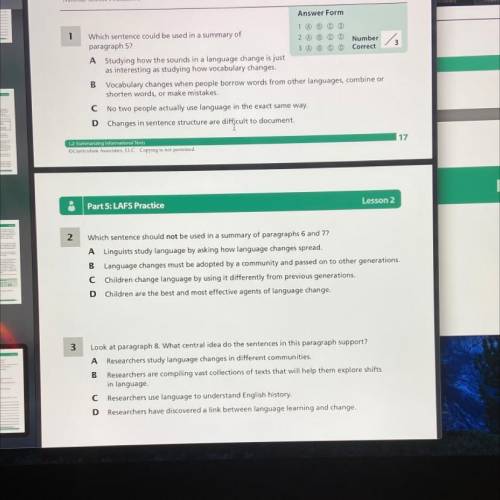.
Part 5: Common Core Practice Lesson 2
pea or many peas. At some point, people mi...

English, 29.03.2020 20:05 yanmanuel2215
.
Part 5: Common Core Practice Lesson 2
pea or many peas. At some point, people mistakenly assumed that the word pease was the plural form of pea, and a new word was born. While vocabulary can change quickly, sentence structure—the order of words in a sentence—changes more slowly. Yet it’s clear that today’s English speakers construct sentences very differently from Chaucer and Shakespeare’s contemporaries (see [table] above). Changes in sound are somewhat harder to document, but at least as interesting. For example, during the so-called “Great Vowel Shift”1 500 years ago, English speakers modified their vowel pronunciation dramatically. This shift represents the biggest difference between the pronunciations of so called Middle and Modern English.
Agents of Change
6 Before a language can change, speakers must adopt new words, sentence structures and sounds, spread them through the community and transmit them to the next generation. According to many linguists—including David Lightfoot, NSF2 assistant director for social, behavioral and economic sciences—children serve as agents for language change when, in the process of learning the language of previous generations, they internalize it differently and propagate a different variation of that language.
7 Linguists study language change by addressing questions such as these: Can we trace the evolutionary path of a language? How do language changes spread through communities? How do historical circumstances influence language change? What is the relationship between language learning and change?
Paths of Change
8 NSF researcher Anthony Kroch of the University of Pennsylvania is trying to understand how language change spreads through populations. With collaborator Beatrice Santorini, he is compiling an electronic collection of Modern English texts covering the time period from 1700 to 1914 (the beginning of World War I). The completed “corpus,” as it is known, will complement three others created independently over the past decade by researchers from the University of Pennsylvania and the University of York, England. The existing works—which span 900 years of English history—contain more than 4.5 million words of text carefully tagged and annotated for linguistic features. The publicly available collection gives researchers a standardized, searchable document to track changes in the English language over time. It helps them explore language shifts in a historical context and examine the link between language learning and change.
1 During the Great Vowel Shift of the fifteenth through the eighteenth centuries, English speakers gradually changed the way they pronounced vowels.
2 National Science Foundatio


Answers: 2
Another question on English

English, 21.06.2019 16:30
Which excerpt best represents the central conflict of “ everyday use”
Answers: 1

English, 21.06.2019 22:00
Write a description about a boy with blonde hair that falls perfectly without him even trying. not about anything else like clothes or personality.
Answers: 2

English, 22.06.2019 03:00
How is the speaker's writing assignment in "theme for english b" affected by his setting in place and time? the speaker focuses more on his fascination with music than on the core of the assignment. the speaker reflects that he has nothing in common with his instructor, who will therefore not understand his essay. the speaker has trouble with the assignment because he questions what is true about his own identity.< < < < < < < < < < < < < < < < < < < < < < < < < < < < < < < < < < < < < < < < ,,
Answers: 2

English, 22.06.2019 07:30
Which characteristic is common to memoirs? a. they analyze all sides of a particular issue. b. they give the entire life story of an author. c. they may include fictional characters. d. they are written in first-person point of view.
Answers: 1
You know the right answer?
Questions

Chemistry, 28.07.2019 16:00


Advanced Placement (AP), 28.07.2019 16:00


English, 28.07.2019 16:00

Geography, 28.07.2019 16:00

English, 28.07.2019 16:00

Social Studies, 28.07.2019 16:00


Mathematics, 28.07.2019 16:00



Mathematics, 28.07.2019 16:00



Spanish, 28.07.2019 16:00

Computers and Technology, 28.07.2019 16:00





